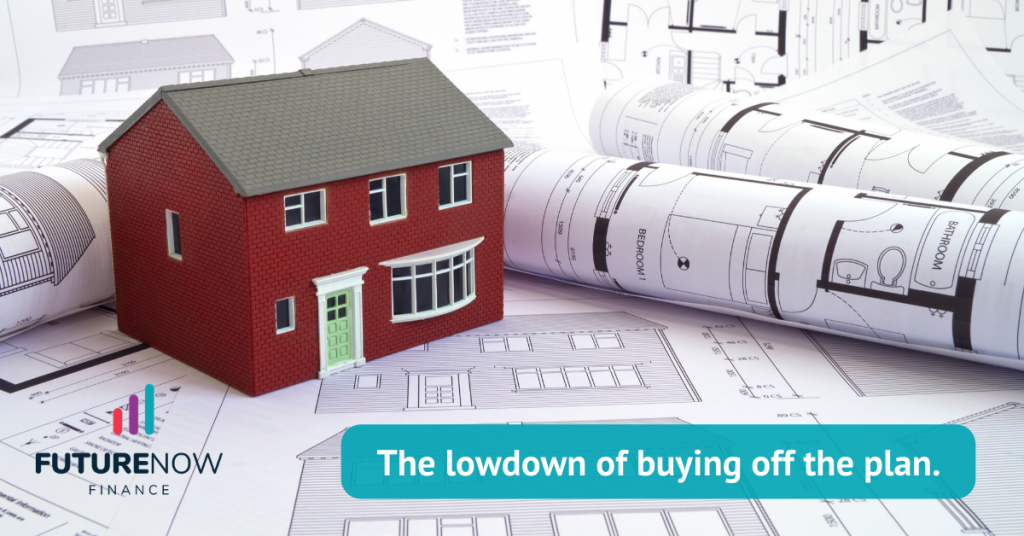There’s something special about being the first person to own something. You know that glorious feeling when you lay your hand on an untouched item for the very first time? That’s the feeling you will get when you step into your newly built home. Buying a home off the plan offers this benefit, amongst many others.
What does it mean to buy off the plan?
Buying a property off the plan means you are committing to purchasing a property that has not been completely built yet. The development may be partially built, or building may not even have begun when you make the purchase. If you’re someone who has trouble visualising things, this might give you cold feet, but don’t worry! In some cases, you will have the opportunity to view a similar property to the one you are purchasing, which will help give you an idea of the style and layout. While there are benefits to buying off the plan, such as affordability, flexibility and potential capital growth, like any other investment, there are some risks that you need to be aware of.
What do I need to know about buying off the plan?
Here’s 7 things you should know about buying off the plan before you sign on the dotted line.
1. Lower costs
As mentioned above, not being able to see your actual property means you will need to use your imagination and visualise what it will look like when built. You also won’t be able to get a full picture of how surrounding properties will be placed and you won’t know who your neighbours are until everyone moves in. Hopefully you won’t be looking at your neighbour’s bathroom window while doing your dishes!
The developer will provide floor plans and artist’s impressions to market the property to you, along with information about the surrounding area, e.g. schools, shopping malls, transport options, etc. They will paint a perfect picture to sell you the property, but the reality is that the final product may not be exactly what you expected. It’s advisable to choose a developer with a good reputation and track record. You could visit their other developments to see the quality of their work as an indication of what you can expect.
2. Lower costs
When buying property, stamp duty is one of the major costs you will need to pay. Stamp duty is a government tax also known as land transfer duty, based on the property’s value at the time the sale contract is signed. The amount may be significantly lower for an off the plan property as it could be based on the unimproved land value rather than the developed land value. This means that the earlier you buy, the bigger your potential saving on stamp duty.
3. Added extras
For developers their goal is to sell as many properties as possible, as quickly as possible. They will often offer incentives and discounts to entice early buyers, so it’s a good idea to jump on the bandwagon and score all the added extras. Getting in early also means that you have the pick of the crop, e.g. best view, corner unit, bigger garden, etc. Although properties in a development are often cookie-cutter, there may be some that are more attractive for various reasons.
4. Quick profit potential
There is potential to generate a profit from the time you put down a deposit to the time that the development is completed, if the property market is doing well. On the flipside, if the market experiences a downturn, you could also lose money. You should do your research and look at market trends before you buy, however this does not guarantee a favourable outcome. There are investors who will use this strategy for capital gains and then sell the property before completion.
5. Contracts more complex
The sale contract you need to sign could be far more complex than for an existing home, so we advise bringing in expert legal advice, so you know exactly what you are signing up for. Pay attention to any inclusions and warranties so that you know where you stand and ensure that there is a clause for your deposit to be reimbursed should the builder go bankrupt.
6. Circumstances change
While waiting for completion of the build, many things could change, e.g. interest rates could go up, you could lose your job, or the property market could take a dive. It’s important that you have funds in reserve and keep saving while you wait so that you have a buffer for unforeseen circumstances.
7. Ongoing costs
If you’re planning to purchase a townhouse or an apartment off the plan you might want to consider these ongoing costs. Aside from the mortgage repayments, you will also need to pay strata fees once you have taken possession. Check what these costs are so that you budget for them in your calculations. A high strata fee might make a property unaffordable to maintain, even if the upfront price was favourable. When there are gardens, pools and gyms to maintain, this can push the fees higher as the maintenance costs are factored in.
There are many things to consider when thinking about buying an off the plan property. Your financial position and risk appetite will impact your decision. We advise that you take the time to do your research and preparation before going ahead.
At FutureNow Finance, we can help you to plan towards buying property, whether you decide to buy off the plan or not. Contact us today if you’d like to discuss your financing options. Call 1300 013 730 or email hello@futurenowfinance.com.au.
If you know of anyone who is thinking of buying property, please share this article with them. You could help them with valuable information about the ins and outs of buying off the plan.

